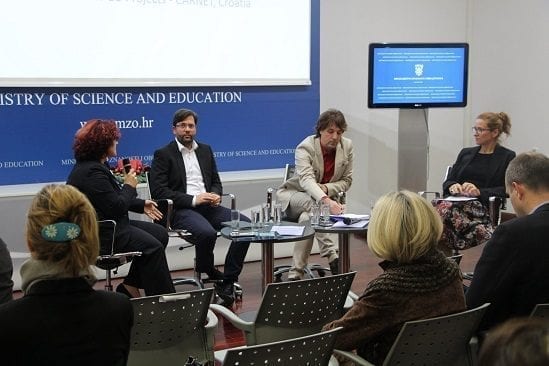CARNET and the Ministry of Science and Education held a Strategic Forum on Digital Maturity of Schools called “Digital Maturity of Schools”. Aside from the Assistant Minister Lidija Kralj, the Forum was attended by Ádám Horváth from the Hungarian Centre for digital Pedagogy and methodology and Borut Čampelj form the Slovenian Ministry of education, science and sports.
The goal of the Forum was to open a discussion on strategic areas and priorities for integration of technology in the school system of the Republic of Croatia which were identified through the process of drafting Strategy for Digital Maturity of schools. The Forum was opened by the Assisstant Minister Lidija Kralj who presented the Strategy that defines and groups areas, priorities and aims in the field of digital transformation of schools and the school system by 2030. At the same time it aims to encourage the development of students into responsible, globally competent and innovative citizens.
The Assistant Minister of science and education Lidija Kralj pointed out the necessity of meaningful and efficient use of technology in order to achieve learning outcomes. „We need new methods which we are lacking today in the process of teacher training”, she concluded.
Some of the discussed topics were adequate network connectivity, equipment and technical support in the teaching with the use of ICT, financing innovations and projects by teachers and students and emphasising domestic and international collaboration of schools.
„Research shows that there is no link between the equipment you have and its intended use. It is equally important to invest as much in human recources and potentials as in technology“, said Borut Čampelj from the Slovenian Ministry of education, science and sports, adding that innovative learning environment should combine these three areas: didactics or the new pedagogy, flexible organization and efficient and meaningful use of ICT.
„Teaching is no longer just providing information.The emphasis should be on pedagogy, not technology. Instead of equipment, more emphasis should be on services of providing accessibility to digital content. The state cannot secure a computer for each student. BYOD is the only sustainable system” said Adam Horwath, sharing experience form Hungary where 300 institutions took part in the process of decision making of the Strategy for the digital development. „Digital pedagogy prepares children for the life in the digital age. The school system should prepare students for modern labour market- teaching them team work, problem-solving skills and working with digital tools is just a portion of a comprehensive strategy of education“, said Horwath.
The process of adopting the Startegy of digital maturity of schools and the school system is based on the scientific and expert evaluation and the initial report of the scientific research of the effects of the CARNET e-Schools project and it references the Framework for digital maturity and external assessment of digital maturity of schools in the Republic of Croatia.



